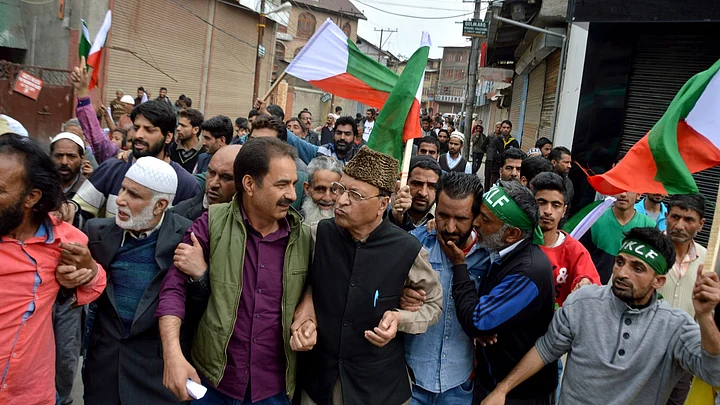On Saturday, 23 March, separatists said the Centre's decision to ban Jammu and Kashmir Liberation Front headed by Yasin Malik was “undemocratic” and “political vendetta.”
Joint Resistance Leadership (JRL), an amalgam of separatist groups, called for a general strike on Sunday to protest against the ban imposed by the government on the JKLF.
"The Government of India's decision of banning the JKLF for five years is highly authoritarian, autocratic and pure political vendetta," the JRL said in a statement.
The JRL urged people of Kashmir to observe a complete shutdown on 24 March against "the arbitrary and undemocratic decision" of the government. It said:
“The way the Government of India is announcing bans and crackdowns on the organisations associated with the Kashmir struggle, arresting the leadership and slapping them with draconian PSA, killing youth in custody .... exposes their hollow claims of democracy.”
The Yasin Malik-led JKLF was banned on Friday for a series of violent acts and being at the forefront of separatist activities in the militancy-hit state since 1988, Union Home Secretary Rajiv Gauba had said.
Listing out its subversive and violent activities, Gauba said the JKLF spearheaded the separatist ideology in Kashmir Valley and the action was taken following the "zero tolerance" policy of the central government against terrorism.
Malik is at present lodged in Kot Balwal jail in Jammu, and is likely to face trial in the three-decade-old case of kidnapping of Rubaya Sayeed and gunning down of four IAF personnel in Srinagar.
The JKLF was founded by Pakistani national Amanullah Khan in mid-1970 at Birmingham in the United Kingdom and came into prominence in 1971 when its member hijacked an Indian Airlines plane flying from Srinagar to Jammu.
A total of 37 FIRs have been registered by the Jammu and Kashmir Police against JKLF and two cases, including that of murder of IAF personnel, were registered by the CBI.
The organisation was also involved in the kidnapping and killing of Ravindra Mhatre, an Indian diplomat posted the UK, in 1984. A week later, India executed Maqbool Bhat, a JKLF activist, who had been sentenced to death.
Normal Life Affected in Kashmir Due to Strike by Separatists Against JKLF Ban
Normal life was affected in Kashmir on Sunday, 24 March, due to a strike called by the Joint Resistance Leadership (JRL), an amalgam of separatist groups, to protest against the ban on Jammu and Kashmir Liberation Front led by Yasin Malik, officials said.
Shops and business establishments remained closed while public transport was off the roads in most parts of the Valley due to the strike called by the JRL, they said.
The officials, however, said the strike call evoked little response in some parts of the Valley as the weekly flea market, locally known as Sunday market, operated normally
This is the second organisation in Jammu and Kashmir which has been banned this month. Earlier, the Centre had banned the Jamaat-e-Islami Jammu and Kashmir.
The Yasin Malik-led JKLF was banned on Friday, 22 March, for a series of violent acts and being in the forefront of separatist activities in the militancy-hit state since 1988, Union Home Secretary Rajiv Gauba had said.
Separatists on Saturday, 23 March, called for a strike against the Centre's decision to ban the JKLF, saying it was "undemocratic" and "political vendetta".
"The Government of India's decision of banning the JKLF for five years is highly authoritarian, autocratic and pure political vendetta," the JRL said in a statement.
“The way the Government of India is announcing bans and crackdowns on the organizations associated with the Kashmir struggle, arresting the leadership and slapping them with draconian PSA, killing youth in custody .... exposes their hollow claims of democracy.”JRL
The JRL said by imposing ban on organisations and booking separatist leaders in "fake" cases , the government "cannot change the reality of the Kashmir issue."
Kashmiri Pandits Thank PM for his 'Bold Step' to Ban JKLF
A Kashmiri organisation on Sunday welcomed the Centre's move to ban separatist organisation JKLF and holding its founder, Yasin Malik, responsible for the genocide of Kashmiri Pandits.
The Global Kashmiri Pandit Diaspora, a joint initiative of Kashmiri Pandit organisations in India and abroad, has been persistently and vehemently demanding the formal acknowledgement that what the Kashmiri Pandits suffered was nothing but genocide, a statement said.
The organisation thanked Prime Minister Narendra Modi for “his bold and honest step” in recognising that the militant movement in “Kashmir is not about liberation, not about economic suffering, not about justice but a theo-fascist movement which has brought great suffering to the land and its people,” the statement added.
"It is so heartening to see that our Prime Minister means business as far as dealing with Pakistan's machinations in Kashmir is concerned," the statement reads.
The "victory" (ban on JKLF) has been achieved because of the sacrifices and hard work of the entire Kashmiri Pandit community, it said.
The GKPD has presented a MoU to Home Minister Rajnath Singh in September, 2018, which articulated that the first and foremost demand of the KP community was to recognise Genocide and Ethnic cleansing of Kashmiri Pandits, the statement said.
Union Home Secretary Rajiv Gauba had said the JKLF was banned as the government has a policy of zero tolerance against terrorism.
The JKLF has been at the forefront of separatist activities in J-K and was involved in the killings of Kashmiri Pandits in 1989 leading to their exodus from the valley, he had said.
“Murders of Kashmiri Pandits by JKLF in 1989 triggered their exodus from the valley. Malik was the mastermind behind the purging of Kashmiri Pandits from Kashmir Valley and is responsible for their genocide.”Rajiv Gauba
(At The Quint, we question everything. Play an active role in shaping our journalism by becoming a member today.)
